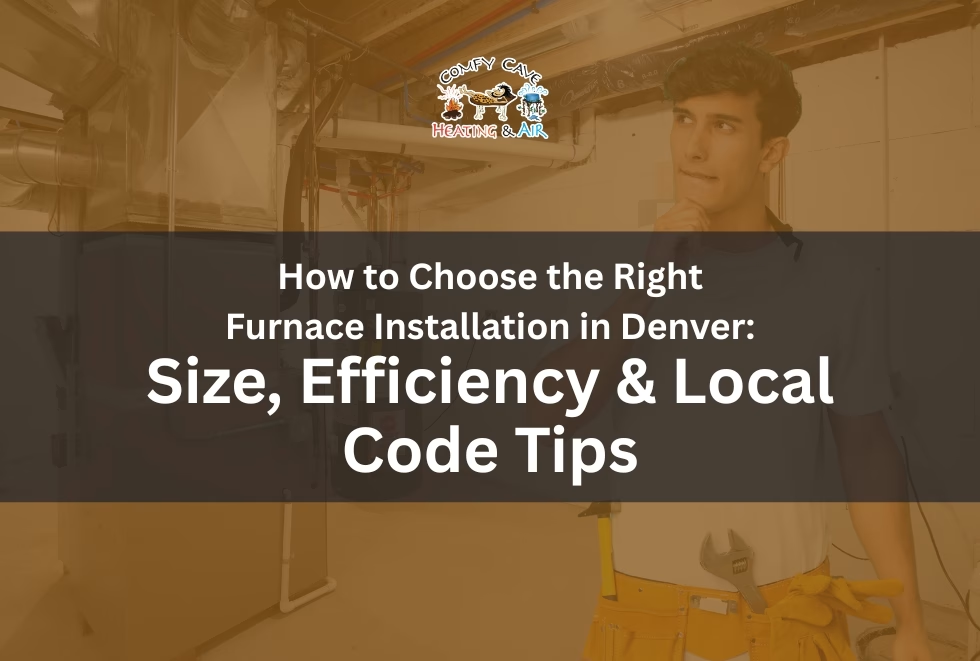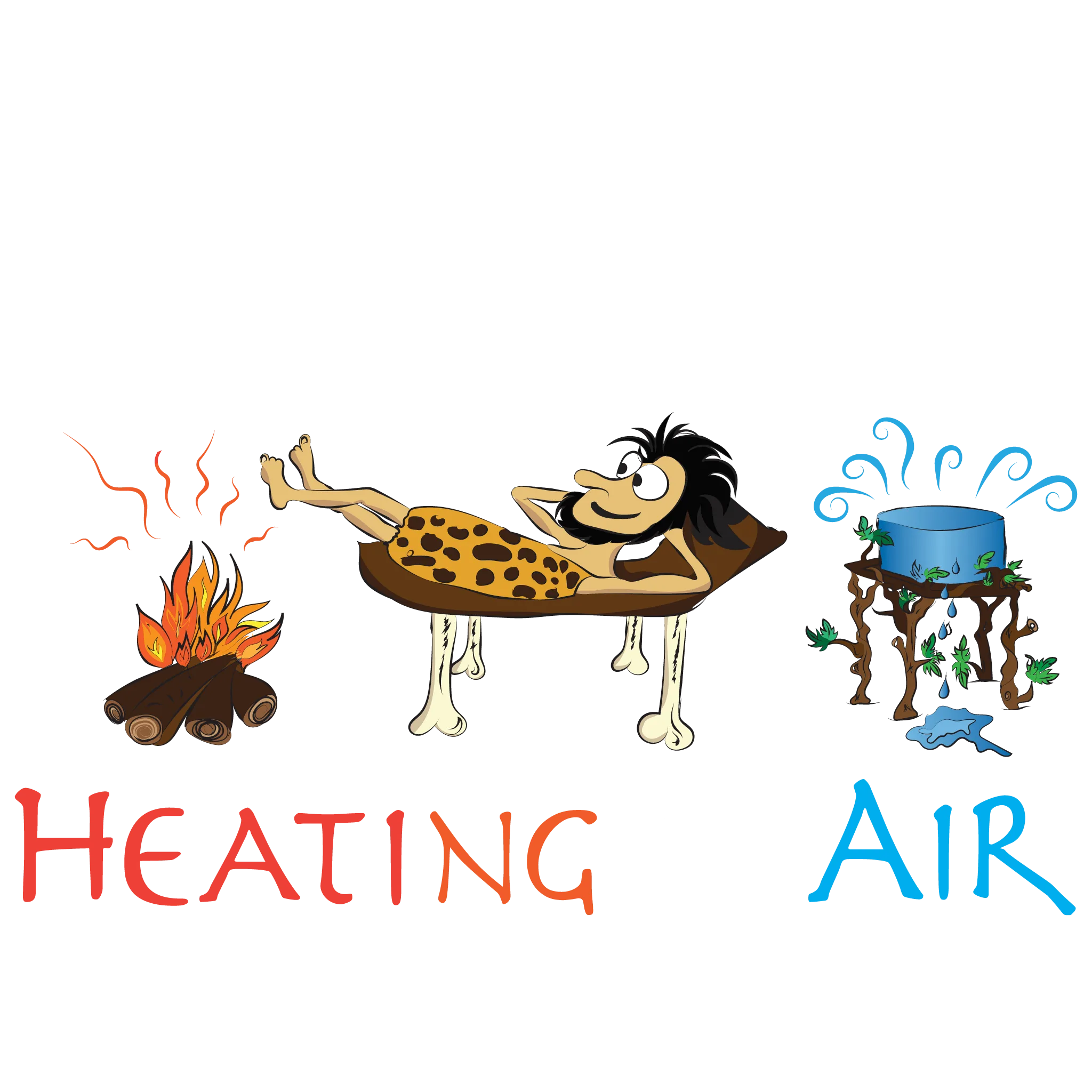
Denver Furnace Installation Guide: Size, Efficiency & Local Codes
By Comfy Cave Heating & Air
Choosing the right furnace for your Denver home isn’t just about brand or price — it’s about making sure your system is the correct size, properly installed for high-altitude performance, and fully compliant with Colorado building codes. A well-chosen and professionally installed furnace means lower utility bills, better comfort, longer lifetime value, and peace of mind during Denver’s cold winters.
This guide breaks everything down clearly — furnace sizing, efficiency ratings, Manual J calculations, Denver’s installation codes, cost expectations, and why working with a trusted HVAC local contractor makes the process stress-free.
1. Furnace Size: Why BTU & Manual J Calculations Matter in Denver
A furnace that's too small won’t heat your home efficiently, and a furnace that’s too large will short-cycle, wear out faster, and waste energy. Size refers to heating output, measured in BTUs (British Thermal Units).
Factors That Affect Furnace Size in Denver
| Factor | Why It Matters |
|---|---|
| Denver Climate & Altitude | Thinner air reduces heat output — furnaces must be calibrated for 5,280 ft elevation. |
| Home Square Footage & Layout | More space = more BTUs. Multi-level homes may need zoning or variable-speed systems. |
| Insulation & Windows | Well-sealed homes require less heating capacity. |
| Home Age & Air Leakage | Older Denver homes often need higher BTU output due to drafts and poor insulation. |
Quick BTU Estimates for Denver Homes
| Home Type | Sq. Ft. | Typical Furnace Size |
|---|---|---|
| Small condo/townhome | 600–1,000 | 25,000–45,000 BTU |
| Average home | 1,200–2,000 | 45,000–80,000 BTU |
| Older or drafty home | 1,500–2,500 | 70,000–120,000 BTU |
| Large or high ceiling home | 2,500+ | 100,000+ BTU |
Important: These are estimates, not final answers.
Manual J = The Professional Way to Size a Furnace
- Square footage and ceiling height
- Window size, insulation, and air leakage
- Number of occupants and internal heat sources
- Denver altitude and winter design temperatures
Professional HVAC companies rely on Manual J to recommend the correct system size — not guesswork.
2. Furnace Efficiency (AFUE) — Why It Matters in Colorado’s Climate
Efficiency is measured by AFUE (Annual Fuel Utilization Efficiency) — how much fuel is converted into usable heat.
| AFUE Rating | Fuel Converted to Heat | Best For |
|---|---|---|
| 80% | Standard efficiency | Mild climates or budget installs |
| 90–94% | High efficiency | Most Denver homes |
| 95–98% | Condensing furnaces | Long-term savings, rebates, new builds |
Why Higher Efficiency is Smart in Denver
- Long heating seasons = more savings
- Altitude slightly reduces gas burn efficiency
- Eligible for rebates from Xcel Energy & federal tax credits
- More consistent comfort with two-stage or variable-speed systems
Example: Upgrading from 80% to 95% AFUE → ~15% lower heating costs annually.
3. Local Codes & Permit Requirements in Denver
Furnace installation in Denver isn’t just about connecting pipes and power — it must follow strict mechanical codes for safety.
| Requirement | Description |
|---|---|
| Mechanical Permit Required | Must be filed before installation. |
| Licensed Installer Only | DIY or unpermitted work can lead to fines or insurance denial. |
| Correct Venting | Standard furnaces use metal flues; 90%+ systems use PVC venting. |
| Combustion Air Supply | Furnace rooms must allow oxygen intake or sealed combustion. |
| Gas Line Standards | Drip leg, shutoff valve, and pressure testing required. |
| Carbon Monoxide Detectors | Colorado law: must be within 15 feet of sleeping areas. |
Inspection Process in Denver
- Permit application
- Rough-in inspection (gas, venting, electrical)
- Final inspection & system testing
- Permit approval
4. Cost of Furnace Installation in Denver
Furnace installation costs depend on the model, labor, efficiency, ductwork, and code upgrades.
| Furnace Type | Price (Installed) |
|---|---|
| 80% AFUE gas furnace | $3,500 – $6,000 |
| 95–98% AFUE high-efficiency | $5,000 – $9,500 |
| Cold-climate heat pump | $6,500 – $12,500 |
| Electric furnace | $2,500 – $5,000 |
What Affects the Total Cost?
- BTU size and AFUE rating
- High-efficiency venting (PVC + condensate drain)
- Ductwork repairs, zoning, or additions
- Smart thermostat, humidifier, or air purification add-ons
- Permit and inspection fees
- High-altitude conversion kits
- Rebates or financing options
Want accurate pricing for your home?
Contact us for a free estimate.
5. Why Professional Furnace Installation Is Non-Negotiable
| Benefit | Why It Matters |
|---|---|
| Safety | Prevents gas leaks, carbon monoxide, and fire risks |
| Proper Sizing (Manual J) | Avoids short-cycling and high utility bills |
| Altitude Adjustment | Ensures accurate combustion at 5,280 ft elevation |
| Code Compliance & Permits | Protects from fines and inspection failures |
| Warranty Protection | Manufacturers require licensed installation |
| Higher Efficiency & Comfort | Correct airflow, venting, thermostat settings |
Final Thoughts on Choosing the Right Furnace for Your Denver Home
Choosing the right furnace for your Denver home isn’t just about picking a unit — it’s about making sure it’s the correct size, highly efficient, and installed according to local safety codes. When your furnace is properly sized using Manual J load calculations, paired with a high-efficiency model (90%+ AFUE), and installed by licensed professionals who understand Denver’s codes and high-altitude requirements, you get more than just heat — you get long-term comfort, safety, energy savings, and peace of mind.
If you’d like expert guidance with sizing, installation, permits, or financing, the team at Comfy Cave Heating & Air is here to help. We’re local, licensed, insured, and committed to doing the job right the first time.
Stay safe, stay warm, and enjoy a comfortable Denver winter.
